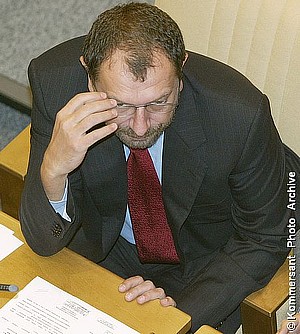
WILL ECONOMIC SANCTIONS BECOME A LEGITIMATE TOOL OF RUSSIAN FOREIGN POLICY?
Publication: Eurasia Daily Monitor Volume: 3 Issue: 227
By:

Russian lawmakers appear to have confirmed the Kremlin’s move to legitimize economic sanctions as an established instrument of the country’s increasingly muscular foreign policy. The jury is still out, however, as to whether this tool will be effective.
On December 6 Russia’s State Duma voted in a first reading to authorize the president to impose economic sanctions on foreign countries. The proposed legislation, “On Special Economic Measures in Case of an International Emergency Situation,” would let the president freeze trade contracts, stop financial transactions, prohibit tourism, and impose other economic sanctions. The sanctions may remain in place for up to four years, with the possibility of renewal for two additional years. In order for the bill to become law, it must pass the Duma after two additional readings and then be signed by the head of state.
The timing of the parliament’s vote is noteworthy, as it comes amid Russia’s bitter standoff with Georgia and Moldova. (Moscow banned wine imports from both countries last March. Subsequently, when tensions with Tbilisi escalated, Russia severed all transportation links with Georgia. While President Vladimir Putin has recently lifted the ban on Moldovan wine, the ban on Georgian wine remains in place.)
When anti-Georgian and anti-Moldovan measures, widely seen as politically motivated, were introduced, Russia lacked any legislation whatsoever that would regulate the imposition of economic sanctions on other countries. Thus, the attempts to discipline Russia’s pesky neighbors were implemented not on the basis of a decision adopted by the country’s legislature or the president. Instead, the buck was passed to the various branches of government or individual state agencies. Now, it would seem, Russia has acquired a legal instrument that other “civilized countries” also possess.
Vladislav Reznik, who heads the Duma’s Credit Organizations and Financial Markets Committee and is the bill’s co-author, said that the United States and some other, unnamed countries have made the imposition of sanctions part of “international practice.” Therefore, he argued, Russia needs to codify its own legislation on the matter. “This is a mechanism for quick reaction in case a tense situation occurs between our country and another,” the legislator contended.
Indeed, the bill’s supporters point out that it was loosely modeled after U.S. law and argue that it would help Russia assert its interests. There is one important difference, however. In the United States, Congress has the right to discuss the expediency and effectiveness of a sanctions regime, whereas the bill approved by the Duma does not envisage such oversight. Rather, the president would notify the Duma and the Federation Council of the planned sanctions, but neither would have a say in the matter.
This aspect of the legislation prompted even some Kremlin-connected analysts to criticize the bill. The measure would further weaken the already enfeebled Russian parliament and would not make the president stronger, they argue.
Ironically, the U.S. example could have also demonstrated to Russian champions of economic sanctions the dubious effectiveness of the policy. According to research done at the U.S.-based Institute for International Economics (IIE), in the 1970s and 1980s, U.S. sanctions led to meaningful results in less than 20% of the cases. The situation did not change in the subsequent decade, but the corresponding U.S. economic losses appeared to increase. According to IIE’s estimates, in 1995, for example, U.S. export revenues were short $15-19 billion because of various trade restrictions imposed on more than 30 countries. Furthermore, these were not the only losses incurred, since the drop in exports also negatively affects employment in export-oriented industries. Besides, economic sanctions do not necessarily guarantee the achievement of their political aims: Washington banned all trade with Cuba in 1962, but the Castro regime (if not Fidel Castro himself) is alive and kicking.
Russia’s own “unofficial” sanctions have, so far, not proved their effectiveness either. The outcome of last January’s “gas war” with Ukraine has probably resulted in rising revenues for Gazprom and its key shareholders, but they did not bring the positions of Moscow and Kyiv closer together and, in addition, badly undermined Russia’s reputation as a reliable energy supplier in the eyes of Europe. The ban on Georgian and Moldovan wine that accounted for some 44% of all in-store wine sales in Russia last year seriously hurt a number of Russian sellers and distributors but did not ruin the economies of the neighboring countries badly enough to force their elites to make strategic concessions to Moscow. Instead, the all-out pressure may compel the post-Soviet countries to accelerate their search for the new economic and political partners and would deepen the divide between them and Moscow.
Finally, the legislation, some analysts provocatively note, appears to contradict the Kremlin statements to the effect that economic sanctions would not work against Iran.
(Vedomosti, Moskovsky komsomolets, Moscow Times, December 7; Newsru.com, December 6)




